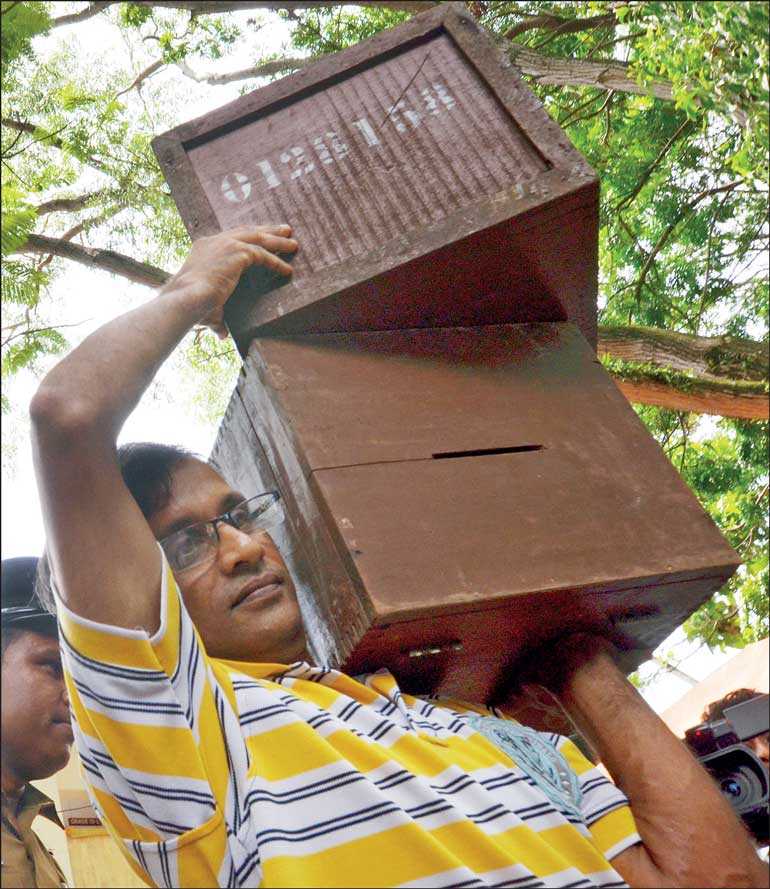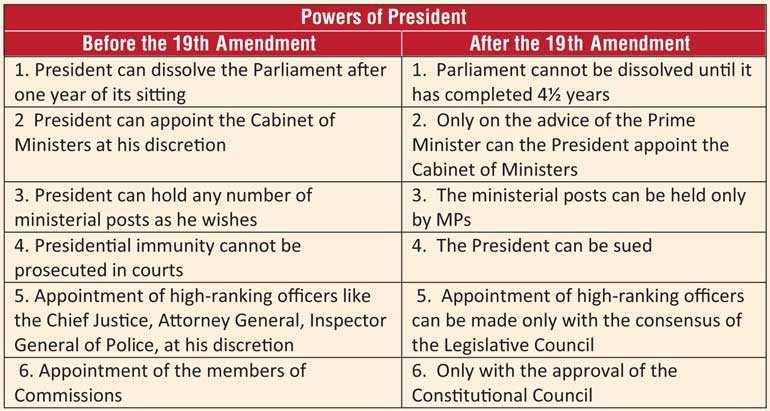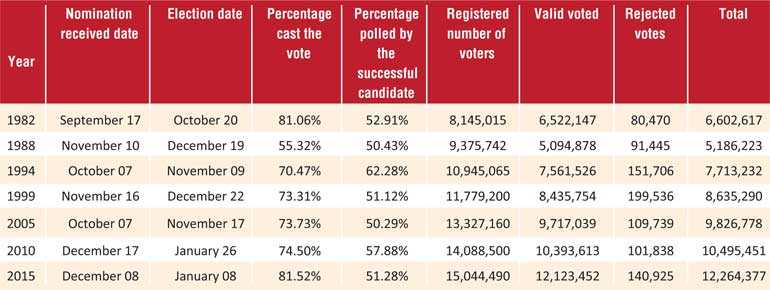Sunday Feb 22, 2026
Sunday Feb 22, 2026
Wednesday, 21 August 2019 00:00 - - {{hitsCtrl.values.hits}}



By Rohana Hettiarachchie
Declaring the Presidential Election can take place in two ways.
Expression of his intention by the incumbent President to go for an election as per Clause 31 (3) of the Constitution
If the President, after expiration of four years from the commencement of his first term of office, expects to obtain a public mandate to hold office for a further term, he can express his intention for appealing to the people for a mandate to hold office. Once he has expressed his intention, the Commission of Elections shall make arrangements to hold a Presidential Election.
Upon expiration of the official term of the President
The poll for the election of the President shall be taken not less than one month and not more than two months before the expiration of the term of office of the President in office and elect an appropriate President. At present, an election must be held after 9 November 2019 and before 9 December 2019. The Election Commission is obliged to carry out all related matters to conduct the Presidential election. Neither the Legislature nor the Executive has the ability to prevent it.
Timeline of the Presidential Election
Declaration of Presidential Election.
Calling Nominations (Nomination Preparation) – from minimum 16 days to a maximum of 21 days are allocated for this.
Deposit to be paid: Deposit should be made before 12 noon on the day before the nomination is accepted. In the case of an independent candidate, he or she should present a certificate from the Secretary General of Parliament that the candidate is or has been a Member of Parliament.
Acceptance of nominations: (Nominations will be accepted on a single day fixed by the Election Commission from 9 a.m. to 11 a.m.)
Submission of objections: (Time between 9 a.m. to 11:30 a.m. on the nominations day are reserved for submission of objections.).
Election Campaign: (Minimum of one month and a maximum of six weeks are allowed for election campaign work. All campaign work must be stopped 48 hours prior to the election.)
Applying for postal voting: (Will be conducted for 10 days from the date of publication of nomination notification and the Election Commission of Sri Lanka has the right to extend this period at its discretion.)
Casting of postal voting: (Usually two days are reserved for this and if required the Election Commission has the right to increase the number of days.)
Election Date: (The Election Commission will decide the date of election after accepting the nominations which should be minimum one month or maximum six weeks from the date of the acceptance of nominations.)
Eligibility to be a Presidential Candidate
Be a Sri Lankan citizen (candidate should not be a citizen of another country)
Should be over 35 years of age
Must be eligible to register as a voter (registration is not required)
Should not be a person disqualified in terms of Articles 91 and 92 of the Constitution
In case of an independent candidate not representing a recognised political party, he or she must be or should have been a Member of Parliament,
The candidate must be able to produce a security, a sum of Rs. 50,000 in legal tender if he or she contests from a political party and Rs. 75,000 if contested from an independent group.
In addition to these qualifications, each candidate must submit an affidavit affirming that he or she does not have any disqualifications for the eligibility to contest the presidential election.
2015 Presidential Election – Candidates and results
Even though 19 candidates contested the 2015 Presidential Election, except for the two main candidates, all the others candidates received only 138,200 votes. Therefore, necessity did not arise for counting the second and third preferences. All 17 candidates failed to make a significant impact on the overall number of votes polled. So, it was not difficult for the successful candidate to secure 50% of the valid votes and one more vote (50%+1).
A summary of the results of previous Presidential Elections held from 1982-2015 is produced on this page. It is evident from the analysis of the results that except for the Presidential Elections held in 1994 and 2010, in all the other elections, there had been an intense competition among the candidates in all the other years.
Will the need arise to count the second and third preferences at the next Presidential Election?
According to the Presidential Elections Act of Sri Lanka, the winning candidate must receive more than one-half of the valid votes cast, i.e. 50% + 1 vote, to be declared the candidate elected to the office of president. Where no candidate has received more than one half of the valid votes cast at the election, the two candidates who had received the highest and the second highest number of votes are eliminated and the second and third preferences marked by each voter on the ballot papers of the other candidates are counted; if their preference is for one of the two main candidates, that too, will be distributed among the two main candidates.
When a candidate is given a second preference, his third preference will be ignored. The candidate, who obtains the majority after the second and third preferential votes are counted, will be declared the winning candidate. Where equality is found to exist between the votes received by two candidates, the determination of the candidate shall be made by a lot by the Commissioner in such manner as he may, in his absolute discretion, determine.
How important will it be to cast preferential votes in the next Presidential Election?
In the 2015 and previous Presidential Elections, competition prevailed only between the two main candidates. But there are indications that there will be a several strong candidates joining the mainstream of the Presidential Election this year.
If a large number of candidates representing the United National Party (UNP), coalition of the People’s Alliance (PA), Sri Lanka Freedom Party (SLFP), Janatha Vimukthi Peramuna (JVP), professionals and civil organisations as one group contest the Presidential Election, and if all other candidates except the two main candidates receive more than 500,000 votes, it is unlikely that no candidate will be able to obtain 50%+1 vote of the valid votes.
In this backdrop, the second and third preferential vote will be important in this election. But the ordinary voter has a very little knowledge about marking the preferential vote. Under the circumstances, it would be very important that the voters are adequately enlightened on marking the second and third preferences (1, 2, 3). In this regard, the Election Commission, monitoring organisations and media institutions have a great responsibility. Similarly, the political parties also need to pay their attention on this issue.
Challenges faced by the voter in selecting a candidate
Powers of the President
The next president to be elected will not be an executive president; the voter does not seem to have a proper understanding about the situation. Not only that, even the political parties themselves and their leaders aspiring to contest the election have not realised it yet; perhaps, they seem to be reluctant to accept it despite the fact they know about it. Since most of the presidents who had been in office since 1978 had exercised executive power to a maximum extent, and the people have got accustomed to it for over four decades, it appears that they are not prepared to accept the change.
It is important that we understand the difference between the powers held by the president before and after introducing the 19th Amendment to the Constitution.
The powers vested in the President in respect of the Provincial Councils have not been amended.
Among the powers, the executive president held prior to the 19th Amendment included the dissolution of Parliament, the appointment of ministers, removal of ministers and assigning ministries over to him were very strong. Former Presidents have used these powers to the maximum in the past. For instance, in 2003, President Chandrika Kumaratunga used executive powers to take over the major ministries held by the UNP and bring them under her control and also to dissolve Parliament and send the UNP Government home. Other Presidents used executive powers to keep the Cabinet of Ministers loyal to them. If it was not for the 19th Amendment, the recent attempt to dissolve the Parliament by the incumbent President would have been legitimate. However, the next President envisaged to be elected will not be an all-powerful president like those held this office prior to the 19th Amendment.
When the President becomes the leader of a political party
If the elected president is happened to be the leader of the political party that commands the majority power in Parliament, though he has no powers from the constitution of the country, still, he can wield considerable power over the group of parliamentarians of the party using the powers derived from the constitution of the political party in which he is the leader. His or her political personality will play a greater role in a situation like this in which the president’s policy statement will gain a significant value. Therefore, it is important that the voters take into account all these factors when deciding the candidate to vote for, in the next presidential election.
Factors that the voters should consider when selecting candidates
Nearly 70% of voters in Sri Lanka are traditionally divided among the line of political parties; it is very rare that they make a careful study about the candidates or the new policies of their parties in casting their vote. However, it is interesting to note that there are about 30% of voters emerging as a strong vote base which is critical and decisive in the country. It is important to note that this segment of voters is politically conscious and they exercise their vote after a careful and comparative study of party policies and candidates fielded by them.
What Sri Lanka needs today is to pull the voters out of political slavery and increase the percentage of the decisive voter segment. And also to build a vigilant group that would monitor the work of their representatives, continually and persistently after the election.
As a person who had been in close touch with democracy for nearly three decades, I would like to add a few points for the voters to think about.
I must say that some of these ideas have been received from the people themselves who attended the programs held by the March 12 Movement throughout the country under the theme ‘the Dream President’. Their views are presented here in honour of those who contributed their views.
1. The voters must pay their attention on the content of the manifesto or the policy statement (political party’s) presented by the presidential candidate and see whether they can be implemented.
2. Level of education, knowledge and vision of the candidate.
The presidential candidate of your choice must be someone with a basic education at least and a sufficient knowledge of Sri Lanka’s economic, social and political development experiences; he or she should have a long-term vision on the direction in which Sri Lanka should be spearheaded during the next 5, 10 decades.
3. Physical and mental fitness
It is essential that the candidate you choose is a person with the physical and mental fitness necessary to lead the country in the next five years.
4. Rule of law and principles of democracy
The candidate you choose should be a person who respects the basic law of the country, the Constitution, the Legislature, the Executive and the Judiciary. Moreover, he or she should be a person who will not (mis)use the presidential powers for the benefit of his own family or his political party.
5. Attitudes and attributes
The candidate must be a person who can treat all ethnic groups equally, without discrimination. Further, he or she should be a person who respects the ethnic and religious diversity of Sri Lanka, human rights, different cultures, and respects local and internationally recognised conventions and traditions.
6. Leadership
The candidate should be a leader, acceptable to all ethnic groups and can be trusted by them. Also, he or she must be capable of providing security for the people and the country and be prepared to listen to all parties in decision making and one who can make unwavering and bold decisions not for his own survival but for the common good of the country .
7. The candidate selected should be skilled in diplomatic relations and in dealings in international affairs and also a knowledgeable and experienced person.
No country can stand alone today. The candidate must possess strategic ability to safeguard Sri Lanka’s identity in the face of economic, social and political power balance in the world.
8. The allegations against candidates if any, must be taken into consideration (If the candidate is already involved in politics and there are allegations against him or her, they should be considered) the charges implied are as follows.
Allegations of bribery
Abuse of power
Neglect of duty, irresponsible conduct
Doing business with the State
9. How to handle the election campaign
Every voter must closely monitor how the candidates conduct their campaign during the election. They must be mindful of the incidents of racism, religious conflicts, and hate speech, acts of violence and violation of election laws or instigating such violations. These are just a few things to be considered by the voters when deciding for a presidential candidate.
This article is intended to serve as a guide to voters to deviate from the system of traditional politics and view the candidates critically, impartially and comparatively without being a slave of party politics.
(The writer is Executive Director, People’s Action for Free & Fair Election.)